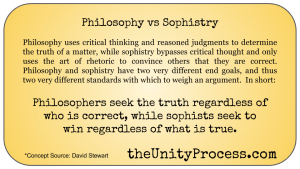
Sophistry; fabricating evidence and arguments to support a position, usually based on an emotional attachment to an identity built upon falsities, rather than allowing reason and evidence to shape a position, regardless of how it affects one’s identity. Attempting to have a rational and fairminded discussion with a sophist is anything but fairminded, and never will be, as the two forms of thinking are motivated by contradictory end goals. One is to support a false and emotionally charged conclusion, and one is to discover the truth, regardless of what the conclusion might be; it is the difference between reasoning from a desired conclusion, and reasoning to discover the conclusion.
To a sophist, the ends (conclusion) justifies the means (the rationale used to get to the conclusion), while to a fairminded individual, the means (the rationale) determines the ends (conclusion). This is also the distinction between reasoning and rationalizing, as reasoning comes before the conclusion and rationalizing comes after the conclusion. It is important that we come to the realization that these are two very different forms of thinking, and that they have two very different means and ends in mind; and as a result, they are unable to coexist in a meaningful discussion, and engagements between the two forms of thinking are unable to produce any satisfying results.
With this in mind, we need to come up with strategies to eliminate our own biased thinking, and to deal with the ways we are still rationalizing rather than reasoning in support of our emotional attachments. We must also come up with ways to deal with sophists, as reasoning will not actually work with them, and will not produce satisfying results. Additionally, sophists tend to be very willing to use coercion to get their way, as they are Machiavellian with their “the ends justify the means” mentality; how can we effectively deal with this reality?
Why would somebody be prone to rationalizing rather than reasoning, what benefits do you think they find from it? Are they actual benefits, or illusory benefits? Is it merely enough to shoot down their false and deceptive arguments with strong arguments, just to sharpen and give us confidence in our own logical positions (such as the parable of Jesus in the wilderness, refuting the temptations of the Devil with logical arguments of his own), or are there other strategies available to us? What might they be?